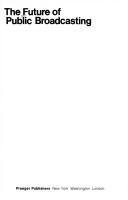| Listing 1 - 10 of 159 | << page >> |
Sort by
|

ISBN: 027556990X Year: 1976 Publisher: London Praeger
Abstract | Keywords | Export | Availability | Bookmark
 Loading...
Loading...Choose an application
- Reference Manager
- EndNote
- RefWorks (Direct export to RefWorks)
Book
ISBN: 9783631665688 3631665687 Year: 2016 Publisher: Frankfurt am Main: Peter Lang,
Abstract | Keywords | Export | Availability | Bookmark
 Loading...
Loading...Choose an application
- Reference Manager
- EndNote
- RefWorks (Direct export to RefWorks)
The book sheds light on the demands of Art. 107(1) TFEU regarding public funding of public service broadcasting (PSB). Broadcasting is of particular importance in the modern structure of democracy. PSB provides broadcasting services that are of higher quality and of more cultural value to the community than services provided by commercial broadcasters. To ensure the operation of PSB, Member States of the European Union have introduced various measures to support broadcasters. These support measures have to comply with European State aid law, which seeks to prevent overcompensation. In its Altmark Trans-ruling, the ECJ laid down specific criteria under which compensation for services of general economic interest (SGEI) should not be considered State aid in the sense of Art. 107(1) TFEU. The author focuses on the Altmarkcriteria. Apart from Art. 107(1) TFEU, he also looks at the effect of the Amsterdam Protocol, which is occasionally argued to have a significant impact on the application of the State aid rules to PSB.

ISBN: 0405117698 Year: 1979 Publisher: New York (N.Y.) : Arno press,
Abstract | Keywords | Export | Availability | Bookmark
 Loading...
Loading...Choose an application
- Reference Manager
- EndNote
- RefWorks (Direct export to RefWorks)
Book
Year: 2020 Publisher: London : University of Westminster Press,
Abstract | Keywords | Export | Availability | Bookmark
 Loading...
Loading...Choose an application
- Reference Manager
- EndNote
- RefWorks (Direct export to RefWorks)
In the face of challenges posed by a shifting digital media landscape, an array of international bodies continue to endorse public service media (PSM) as an essential component of democratisation. Yet how can PSM achieve viability in settings where models of media independence and credibility are unfamiliar or rejected by political leaders? The answer lies in a holistic approach that is neither media-centric nor defeatist about PSM's place in a landscape marked by younger generations' widespread preference for social media platforms. There are more ways of working towards PSM than are often recognized. Wide-ranging research from media NGOs and academics demonstrates the potential of diverse, incremental approaches to embedding the values and mechanisms of PSM. These are as likely to involve regulatory and licensing institutions, unions of media practitioners, audiences, advocacy groups or social media platforms as content producers themselves. This Policy Brief considers the issues, research and policy options around achieving viability for PSM. It concludes with six recommendations that are relevant to policymakers, practitioners and media studies specialists.
Book
Year: 2020 Publisher: London : University of Westminster Press,
Abstract | Keywords | Export | Availability | Bookmark
 Loading...
Loading...Choose an application
- Reference Manager
- EndNote
- RefWorks (Direct export to RefWorks)
In the face of challenges posed by a shifting digital media landscape, an array of international bodies continue to endorse public service media (PSM) as an essential component of democratisation. Yet how can PSM achieve viability in settings where models of media independence and credibility are unfamiliar or rejected by political leaders? The answer lies in a holistic approach that is neither media-centric nor defeatist about PSM's place in a landscape marked by younger generations' widespread preference for social media platforms. There are more ways of working towards PSM than are often recognized. Wide-ranging research from media NGOs and academics demonstrates the potential of diverse, incremental approaches to embedding the values and mechanisms of PSM. These are as likely to involve regulatory and licensing institutions, unions of media practitioners, audiences, advocacy groups or social media platforms as content producers themselves. This Policy Brief considers the issues, research and policy options around achieving viability for PSM. It concludes with six recommendations that are relevant to policymakers, practitioners and media studies specialists.
Book
Year: 2020 Publisher: London : University of Westminster Press,
Abstract | Keywords | Export | Availability | Bookmark
 Loading...
Loading...Choose an application
- Reference Manager
- EndNote
- RefWorks (Direct export to RefWorks)
In the face of challenges posed by a shifting digital media landscape, an array of international bodies continue to endorse public service media (PSM) as an essential component of democratisation. Yet how can PSM achieve viability in settings where models of media independence and credibility are unfamiliar or rejected by political leaders? The answer lies in a holistic approach that is neither media-centric nor defeatist about PSM's place in a landscape marked by younger generations' widespread preference for social media platforms. There are more ways of working towards PSM than are often recognized. Wide-ranging research from media NGOs and academics demonstrates the potential of diverse, incremental approaches to embedding the values and mechanisms of PSM. These are as likely to involve regulatory and licensing institutions, unions of media practitioners, audiences, advocacy groups or social media platforms as content producers themselves. This Policy Brief considers the issues, research and policy options around achieving viability for PSM. It concludes with six recommendations that are relevant to policymakers, practitioners and media studies specialists.
Book
ISBN: 9871751931 Year: 2020 Publisher: Córdoba : Universidad Nacional de Córdoba.,
Abstract | Keywords | Export | Availability | Bookmark
 Loading...
Loading...Choose an application
- Reference Manager
- EndNote
- RefWorks (Direct export to RefWorks)
This book examines the transformation and management of public media in Córdoba, Argentina, focusing on the period from 2007 to 2016. It explores the policies and strategies employed by the Servicios de Radio y Televisión de la Universidad Nacional de Córdoba (SRT) in adapting to changes in the media landscape. The author, Juan Martín Zanotti, analyzes the impact of regulatory frameworks, such as the audiovisual law and Argentina Digital, on media operations and content policies. The book highlights the challenges and opportunities faced by SRT, including technological advancements, economic constraints, and the need for innovation in programming to reflect cultural and societal dynamics. Targeted at academics, media professionals, and policy makers, it provides insights into the complexities of managing public media institutions in a rapidly evolving environment.
Book
ISBN: 9781443853033 1443853038 Year: 2013 Publisher: Newcastle upon Tyne: Cambridge scholars,
Abstract | Keywords | Export | Availability | Bookmark
 Loading...
Loading...Choose an application
- Reference Manager
- EndNote
- RefWorks (Direct export to RefWorks)
Book
Year: 2004 Publisher: Morlanwelz: Musée royal de Mariemont,
Abstract | Keywords | Export | Availability | Bookmark
 Loading...
Loading...Choose an application
- Reference Manager
- EndNote
- RefWorks (Direct export to RefWorks)
Book
ISBN: 340609337X Year: 1984 Publisher: München : Beck,
Abstract | Keywords | Export | Availability | Bookmark
 Loading...
Loading...Choose an application
- Reference Manager
- EndNote
- RefWorks (Direct export to RefWorks)
Public broadcasting --- Finance --- Congresses.
| Listing 1 - 10 of 159 | << page >> |
Sort by
|

 Search
Search Feedback
Feedback About UniCat
About UniCat  Help
Help News
News